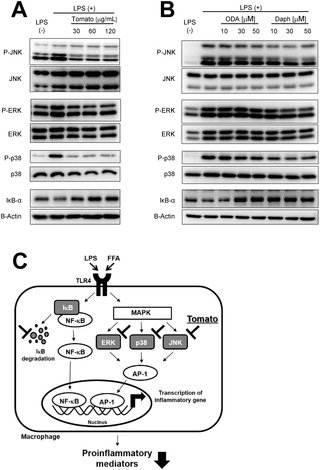PLOS ONE ( IF 3.7 ) Pub Date : 2018-01-12 , DOI: 10.1371/journal.pone.0191203 Shinsuke Mohri , Haruya Takahashi , Maiko Sakai , Shingo Takahashi , Naoko Waki , Koichi Aizawa , Hiroyuki Suganuma , Takeshi Ara , Yasuki Matsumura , Daisuke Shibata , Tsuyoshi Goto , Teruo Kawada

|
Obesity-induced chronic inflammation is a key factor in type 2 diabetes. A vicious cycle involving pro-inflammatory mediators between adipocytes and macrophages is a common cause of chronic inflammation in the adipose tissue. Tomato is one of the most popular vegetables and is associated with a reduced risk of diabetes. However, the molecular mechanism underlying the effect of tomato on diabetes is unclear. In this study, we focused on anti-inflammatory compounds in tomato. We found that the extract of tomato reduced plasma glucose and inflammatory markers in mice. We screened anti-inflammatory fractions in tomato using lipopolysaccharide-stimulated RAW264.7 macrophages, and active compounds were estimated by liquid chromatography-mass spectrometry over a wide range. Surprisingly, a large number of compounds including oxylipin and coumarin derivatives were estimated as anti-inflammatory compounds. Especially, 9-oxo-octadecadienoic acid and daphnetin suppressed pro-inflammatory cytokines in RAW264.7 macrophages inhibiting mitogen-activated protein kinase phosphorylation and inhibitor of kappa B α protein degradation. These findings suggest that tomato containing diverse anti-inflammatory compounds ameliorates chronic inflammation in obese adipose tissue.
中文翻译:

使用LC-MS广泛筛选番茄中的抗炎化合物并阐明其功能机理
肥胖引起的慢性炎症是2型糖尿病的关键因素。脂肪细胞和巨噬细胞之间涉及促炎性介质的恶性循环是脂肪组织中慢性炎症的常见原因。番茄是最受欢迎的蔬菜之一,可降低患糖尿病的风险。但是,番茄对糖尿病的影响的分子机制尚不清楚。在这项研究中,我们专注于番茄中的抗炎化合物。我们发现番茄提取物可降低小鼠的血浆葡萄糖和炎性标志物。我们使用脂多糖刺激的RAW264.7巨噬细胞筛选了番茄中的抗炎成分,并通过液相色谱-质谱法在较大范围内估算了活性化合物。出奇,据估计,包括氧脂和香豆素衍生物在内的大量化合物是抗炎化合物。特别是,9-氧代十八碳二烯酸和树胶蛋白抑制了RAW264.7巨噬细胞中的促炎细胞因子,从而抑制了促分裂原活化的蛋白激酶磷酸化和kappa Bα蛋白降解的抑制剂。这些发现表明,包含多种抗炎化合物的番茄改善了肥胖脂肪组织中的慢性炎症。



























 京公网安备 11010802027423号
京公网安备 11010802027423号